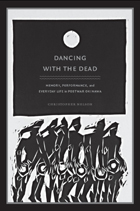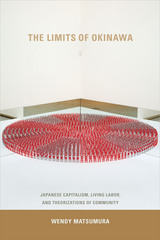2 books about Okinawa-ken (Japan)

Dancing with the Dead
Memory, Performance, and Everyday Life in Postwar Okinawa
Christopher T. Nelson
Duke University Press, 2008
Challenging conventional understandings of time and memory, Christopher T. Nelson examines how contemporary Okinawans have contested, appropriated, and transformed the burdens and possibilities of the past. Nelson explores the work of a circle of Okinawan storytellers, ethnographers, musicians, and dancers deeply engaged with the legacies of a brutal Japanese colonial era, the almost unimaginable devastation of the Pacific War, and a long American military occupation that still casts its shadow over the islands. The ethnographic research that Nelson conducted in Okinawa in the late 1990s—and his broader effort to understand Okinawans’ critical and creative struggles—was inspired by his first visit to the islands in 1985 as a lieutenant in the U.S. Marine Corps.
Nelson analyzes the practices of specific performers, showing how memories are recalled, bodies remade, and actions rethought as Okinawans work through fragments of the past in order to reconstruct the fabric of everyday life. Artists such as the popular Okinawan actor and storyteller Fujiki Hayato weave together genres including Japanese stand-up comedy, Okinawan celebratory rituals, and ethnographic studies of war memory, encouraging their audiences to imagine other ways to live in the modern world. Nelson looks at the efforts of performers and activists to wrest the Okinawan past from romantic representations of idyllic rural life in the Japanese media and reactionary appropriations of traditional values by conservative politicians. In his consideration of eisā, the traditional dance for the dead, Nelson finds a practice that reaches beyond the expected boundaries of mourning and commemoration, as the living and the dead come together to create a moment in which a new world might be built from the ruins of the old.
Nelson analyzes the practices of specific performers, showing how memories are recalled, bodies remade, and actions rethought as Okinawans work through fragments of the past in order to reconstruct the fabric of everyday life. Artists such as the popular Okinawan actor and storyteller Fujiki Hayato weave together genres including Japanese stand-up comedy, Okinawan celebratory rituals, and ethnographic studies of war memory, encouraging their audiences to imagine other ways to live in the modern world. Nelson looks at the efforts of performers and activists to wrest the Okinawan past from romantic representations of idyllic rural life in the Japanese media and reactionary appropriations of traditional values by conservative politicians. In his consideration of eisā, the traditional dance for the dead, Nelson finds a practice that reaches beyond the expected boundaries of mourning and commemoration, as the living and the dead come together to create a moment in which a new world might be built from the ruins of the old.
[more]

The Limits of Okinawa
Japanese Capitalism, Living Labor, and Theorizations of Community
Wendy Matsumura
Duke University Press, 2015
Since its incorporation into the Japanese nation-state in 1879, Okinawa has been seen by both Okinawans and Japanese as an exotic “South,” both spatially and temporally distinct from modern Japan. In The Limits of Okinawa, Wendy Matsumura traces the emergence of this sense of Okinawan difference, showing how local and mainland capitalists, intellectuals, and politicians attempted to resolve clashes with labor by appealing to the idea of a unified Okinawan community. Their numerous confrontations with small producers and cultivators who refused to be exploited for the sake of this ideal produced and reproduced “Okinawa” as an organic, transhistorical entity. Informed by recent Marxist attempts to expand the understanding of the capitalist mode of production to include the production of subjectivity, Matsumura provides a new understanding of Okinawa's place in Japanese and world history, and it establishes a new locus for considering the relationships between empire, capital, nation, and identity.
[more]
READERS
Browse our collection.
PUBLISHERS
See BiblioVault's publisher services.
STUDENT SERVICES
Files for college accessibility offices.
UChicago Accessibility Resources
home | accessibility | search | about | contact us
BiblioVault ® 2001 - 2024
The University of Chicago Press









